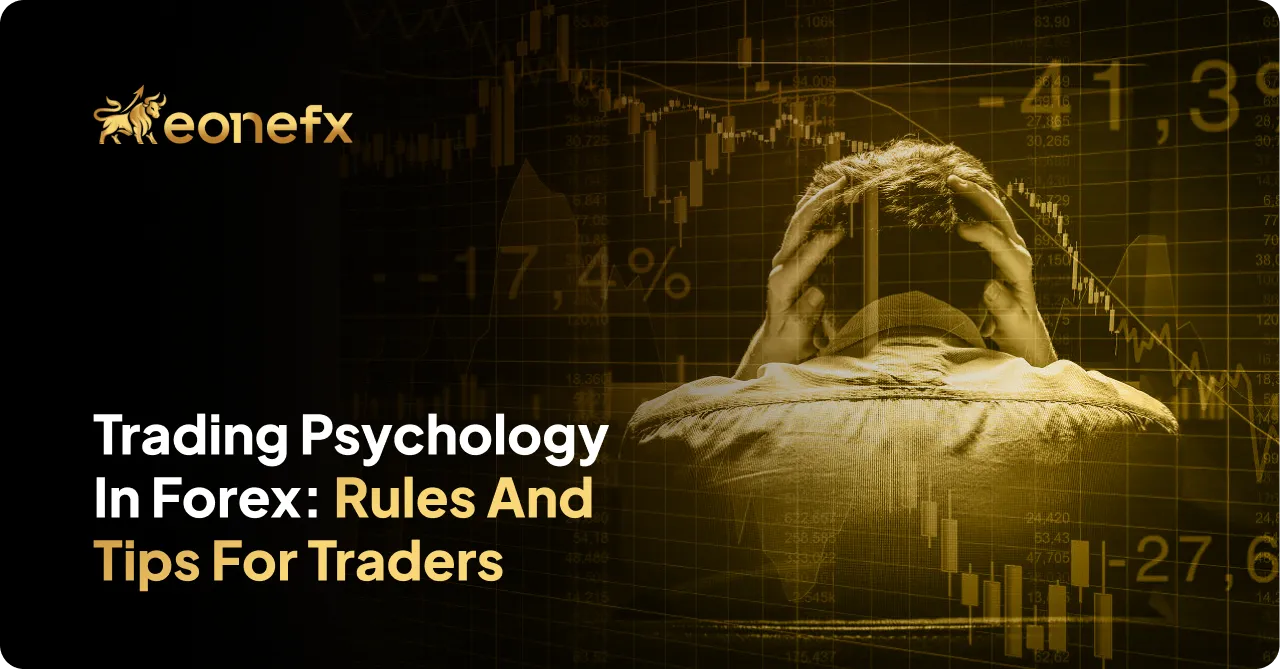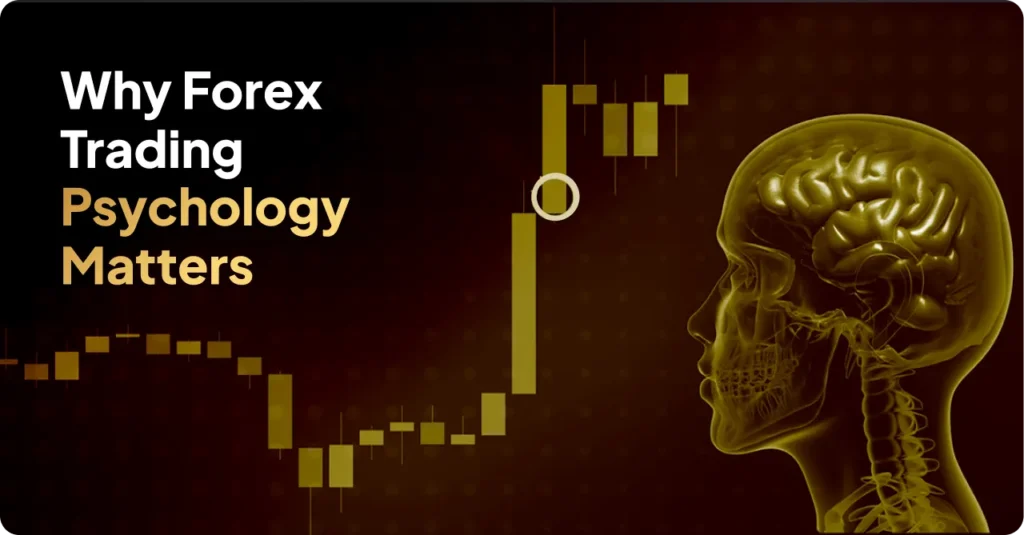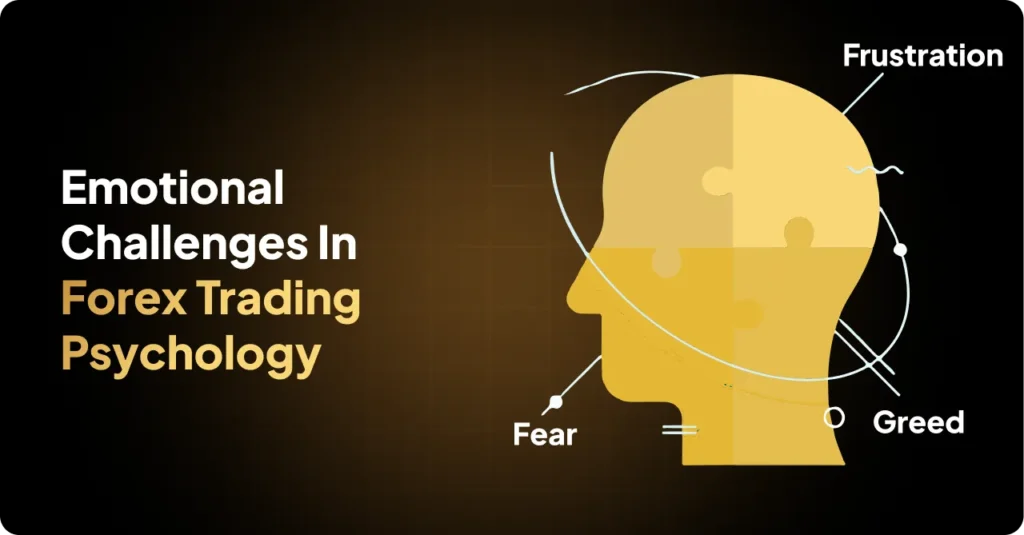Forex Trading Psychology: Rules and Tips for Forex Traders
By EoneFX Insights
12 February 2025

Forex trading psychology refers to the mental and emotional factors that influence the decisions you make while trading. In Forex Psychology, it’s not just about understanding market trends, charts, or numbers; it’s about how you handle your emotions, like fear, greed, and excitement, that can make or break your success.
Forex trading psychology can be mentally challenging. The market is often unpredictable, and emotions can easily take over. Traders who can manage their emotions, stay calm under pressure, and make rational decisions are more likely to succeed. Whether you are a beginner or an experienced trader, mastering your trading psychology is essential for long-term success in the Forex Psychology market. This guide will help you understand how emotions affect your decisions and offer tips to build a stronger, more disciplined mindset.
Why Forex Trading Psychology Matters
The success of a trader is not only about understanding the market or analyzing data, but also about how they control their emotions. A trader’s decisions are strongly influenced by their feelings and mental state. When a trader makes a decision, it can be affected by emotions like fear, excitement, or even overconfidence.

To make decisions, traders use different methods like fundamental analysis, where they look at data from a company’s financial statements and other economic information. Or, they might use technical analysis, which looks at past market prices and trading volumes. But no matter what method they use, their personal biases or mental shortcuts can influence how they interpret this data. These biases can cause mistakes in judgment, leading to poor decisions and affecting the performance of their investments.
In simple terms, how a trader feels and thinks can have a big impact on their choices, which in turn affects how well their portfolio performs. So, controlling your emotions and staying clear-headed is key to making better trading decisions.
Emotional Challenges in Forex Trading Psychology
In Forex trading, it’s not just about analyzing numbers and charts. The way traders feel—especially their emotions—can deeply influence their decisions. Fear, greed, and frustration are some of the strongest emotions traders face. Let’s take a closer look at each of these emotions and how they can affect trading.

1. Fear
Fear is one of the most common emotions in Forex trading Psychology. It happens when traders worry about losing money or making the wrong decision. This fear often makes traders hesitate and second-guess themselves. Instead of making a move, they might freeze, afraid of taking a loss.
How to Manage Fear:
The first step is understanding that fear is a normal feeling in forex trading psychology. Every trader feels fear at some point, especially when the market is unpredictable. The trick is not to let fear control your actions. One way to manage fear is to have a clear trading plan with set goals. When you have a plan, you’ll be more confident in your decisions and less likely to panic when things don’t go as expected. Also, using stop-loss orders can help limit potential losses, which can ease the fear of large financial setbacks.
2. Greed
Greed is another emotion that often leads traders to make poor decisions. It happens when traders want to make huge profits quickly, sometimes by taking unnecessary risks. For example, a trader might keep a trade open, hoping for bigger profits, even when they’ve already made a good gain. They might ignore their initial plan and think, “If I just wait a little longer, I’ll make even more money.”
How to Manage Greed:
The best way to avoid greed is to set realistic profit goals and stick to them. Instead of hoping for huge, quick profits, focus on steady and consistent gains. It’s also important to know when to make a profit. Traders should use take-profit orders, which automatically close a trade when it reaches a certain profit level. This helps to lock in profits and prevents the temptation to hold out for more, which might backfire.
3. Frustration
Frustration is a feeling that many traders experience when the market doesn’t seem to be giving them any good trading opportunities. For example, there might be days when the market is flat or moving in unpredictable ways. When this happens, traders might feel stuck, especially if they’ve been looking for the perfect trade. Frustration can make traders rush into trades just to feel like they’re doing something, even if the market doesn’t support it.
How to Manage Frustration:
The key to handling frustration is patience. Not every moment in the market will be perfect for trading, and that’s okay. It’s important to remember that sometimes it’s better to wait for the right conditions instead of forcing a trade. A good trader knows when to step back and wait for the market to present a better opportunity. By thinking long-term and sticking to your strategy, you can avoid making impulsive decisions out of frustration.
Techniques for Emotional Management in Forex Trading Psychology
Forex Psychology can be a rollercoaster of emotions. From the excitement of potential profits to the stress of losses, emotions can easily influence trading decisions. To help manage these emotions, there are a few powerful techniques that traders can use to stay calm, focused, and make better decisions. Let’s look at some of these techniques: mindfulness and meditation, breathing exercises, and visualization.
1. Mindfulness and Meditation
Mindfulness and meditation are simple practices that can have a big impact on how you handle your emotions while trading. Mindfulness means paying full attention to the present moment. Instead of worrying about past losses or future gains, traders can focus on what’s happening right now, helping them stay calm and clear-headed.
Meditation is another tool that helps reduce stress and increase focus. By taking a few minutes to meditate each day, traders can clear their minds, reduce anxiety, and build the emotional strength needed to make rational decisions. This practice helps traders stay grounded, especially during moments of uncertainty in the market.
By being mindful, traders can avoid making decisions based on panic or excitement. They can stay calm and focused, making better decisions even when the market is volatile.
2. Breathing Exercises
Breathing exercises are a quick and easy way to calm the mind and body before making trading decisions. When trading, it’s easy to get caught up in the stress of the moment. But by taking a few deep breaths, traders can reduce tension and bring more clarity to their thinking.
One common breathing technique is called deep breathing. In deep breathing, traders slowly inhale through their nose for four seconds, hold their breath for a few seconds, and then slowly exhale for four seconds. Doing this a few times can lower stress levels and bring mental focus.
3. Visualization
Visualization is a technique where traders imagine themselves succeeding in their trades. By mentally visualizing positive outcomes—such as making a successful trade or staying calm during a market downturn—traders can boost their confidence and reduce anxiety.
Traders can take a few minutes each day to close their eyes and picture themselves making smart, successful trades. They can visualize staying calm, following their strategy, and making decisions based on facts rather than emotions. This helps build a positive attitude and reinforces the belief that they can handle whatever comes their way.
Addressing Cognitive Biases in Forex Trading
In Forex trading psychology, traders are not always objective in their decision-making. Their emotions and mental shortcuts, known as cognitive biases, can influence their choices and lead to poor results. By recognizing and addressing these biases, traders can make more rational decisions and improve their trading success. Let’s explore some common cognitive biases that affect traders: confirmation bias, overconfidence bias, and loss aversion bias, and how to manage them.
1. Confirmation Bias
Confirmation bias happens when traders look for information that supports their current beliefs or decisions, while ignoring or dismissing anything that contradicts them. For example, if a trader believes a certain currency pair will rise, they might only look for news or data that suggests the price will go up, while ignoring warnings or negative news that suggest the opposite.
How it Affects Trading:
This bias can lead to poor decision-making because traders may ignore warning signs or contrary evidence, which could result in significant losses. They might hold onto a bad trade simply because they refuse to consider that their initial judgment might be wrong.
How to Overcome It:
To reduce confirmation bias, traders should actively look for information that challenges their beliefs. They can make a conscious effort to seek out different viewpoints and evaluate all the facts, not just those that support their decisions. Keeping an open mind helps traders make more balanced and objective decisions.
2. Overconfidence Bias
Overconfidence bias occurs when traders believe they know more than they actually do or when they overestimate their ability to predict market movements. This can lead to excessive risk-taking, as traders might take bigger positions or make trades without proper analysis, believing they have an edge in the market.
How it Affects Trading:
Overconfidence can cause traders to think they are always right, which may result in taking unnecessary risks. This bias can also lead to bigger losses, as traders may ignore important data or fail to set proper risk management measures, such as stop-loss orders.
How to Overcome It:
A good way to fight overconfidence is to keep a trading journal. By tracking every trade, including why it was made and what the outcome was, traders can see their strengths and weaknesses. A journal helps traders objectively evaluate their past decisions and gain a realistic understanding of their performance. This encourages them to stay humble and avoid unnecessary risks.
3. Loss Aversion Bias
Loss aversion bias refers to the tendency to feel the pain of losses more strongly than the pleasure of gains. Because of this, traders may hold onto losing positions for too long, hoping the market will turn in their favor, instead of cutting their losses and moving on.
How it Affects Trading:
Loss aversion bias can cause traders to avoid making tough decisions, like closing a losing position, because they are afraid of accepting a loss. This can lead to bigger losses if the market continues to move against them, as they wait too long for a reversal that may never come.
How to Overcome It:
The best way to combat loss aversion is to set clear stop-loss levels before entering a trade. A stop-loss is a pre-determined price at which a trader will exit a losing trade to limit losses. By sticking to these levels and not allowing emotions to dictate decisions, traders can avoid holding onto losing positions for too long. Our forex trading in USA will help you in a better plan development.
Building and Maintaining Confidence in Forex Trading
Confidence in Forex Psychology takes time, experience, and a strong mindset. Here’s how traders can develop and maintain it:
1. Developing Trading Confidence
- Understand the Market: Learn about trends, economic factors, and currency behaviors to make informed decisions.
- Have a Clear Strategy: A well-defined plan reduces stress and improves decision-making.
- Backtest Your Strategies: Testing strategies on past data helps validate their effectiveness.
- Start Small: Begin with small trades to gain experience and confidence gradually.
2. Maintaining Confidence Through Drawdowns
- Accept Drawdowns: Losses are part of trading—stay emotionally detached.
- Stick to Risk Management: Limit risk per trade to protect capital and reduce stress.
- Analyze Losses: Review trades to identify weaknesses and improve strategies.
- Stay Resilient: Every trader faces losses—focus on long-term growth and improvement.
Overcoming Trading Plateaus and Burnout in Forex Trading
Trading can be exciting and profitable, but it also comes with challenges like stagnation and burnout. Recognizing and addressing these issues is key to long-term success.
Identifying Trading Plateaus
A trading plateau occurs when a trader’s performance stops improving. This can happen due to overtrading, failure to adapt to market changes, or sticking to the same routine without innovation. Overtrading can lead to exhaustion and poor decision-making, while using outdated strategies may limit growth. To overcome a plateau, traders should regularly review their trading plans, seek external advice (forex trading in UAE), and continuously learn new Forex strategies and market trends.
Combating Burnout
Burnout is a state of mental and physical exhaustion caused by prolonged stress. It often results from excessive screen time, information overload, and emotional pressure from trading decisions. To prevent burnout, traders should establish a balanced routine, take regular breaks, and engage in non-trading activities like exercise or hobbies. Recognizing early signs of burnout is essential, as stepping back and refreshing the mind can help maintain focus and long-term success in trading.
How Can Traders Overcome Biases to Avoid Pitfalls?
Biases can lead to poor decisions and financial losses, but traders can use strategies to avoid them. By becoming aware of biases and taking specific actions, traders can make better, more rational decisions. Here are some key strategies suggested by our traders expert in forex trading in uae:
1. Educate Yourself on Behavioral Finance
Understanding how biases, like confirmation bias and overconfidence, affect your decision-making is the first step in overcoming them. Educating yourself about these mental shortcuts helps you recognize when they are influencing your trades, allowing you to make more rational choices. Get in contact with Eonefx, best forex psychology agent available for forex trading in UAE.
2. Create and Follow a Trading Plan
A solid trading plan with clear rules, entry/exit strategies, and risk management can help you stay disciplined. It prevents impulsive decisions driven by emotions like fear or greed. By sticking to your plan, you maintain control over your trades, even during volatile times.
3. Use Objective Analysis
Rely on fundamental and technical analysis rather than emotions or gut feelings. Assess data such as company financials or market price patterns to make informed decisions. This helps you avoid biases that arise from emotional reactions or incomplete information.
4. Consider Contrarian Views
Avoid herd mentality by seeking different opinions and perspectives. Looking at a range of viewpoints helps you stay open to new information and avoid following popular trends that may not be backed by solid data.
5. Reflect and Learn from Your Trades
After each trade, reflect on your decisions. Were any biases involved? Regular self-reflection helps you identify areas where you might be influenced by emotions or preconceived beliefs, improving your future trading decisions. To get the best result, join Eonefx, one of the Best Forex Psychology across countries.
FAQs
What is the psychology behind forex trading?
Forex trading psychology refers to the mental and emotional state of traders that affects their decision-making. It includes managing emotions like fear, greed, and stress, which can impact trading choices and outcomes.
What is the psychological level in forex trading?
Forex Psychology refers to key price points where traders expect the market to react. These levels are often round numbers (e.g., 1.2000 in EUR/USD) and can influence traders’ decisions due to their psychological significance.
How to master psychology in forex?
To master psychology in forex, traders need to control their emotions, stick to a trading plan, and maintain discipline. Techniques like mindfulness, deep breathing, and maintaining a positive mindset can also help in staying calm and focused during trades.
What is the 1% rule in trading?
The 1% rule in trading means risking no more than 1% of your trading capital on a single trade. This helps limit losses and manage risk, allowing traders to protect their capital over the long term.
Table of Contents
- Why Forex Trading Psychology Matters
- Emotional Challenges in Forex Trading Psychology
- Techniques for Emotional Management in Forex Trading Psychology
- Addressing Cognitive Biases in Forex Trading
- Building and Maintaining Confidence in Forex Trading
- Overcoming Trading Plateaus and Burnout in Forex Trading
- How Can Traders Overcome Biases to Avoid Pitfalls?
- FAQs


